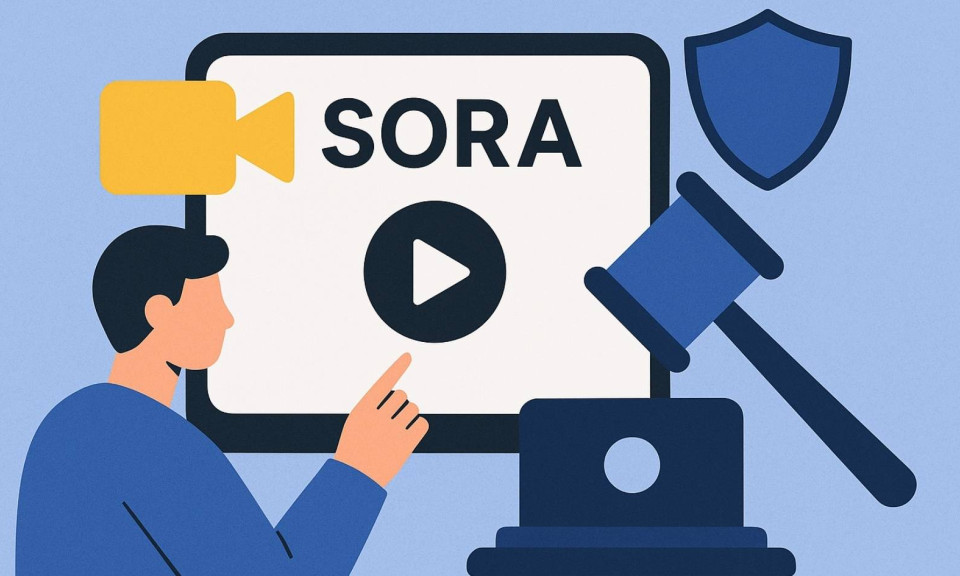OpenAI launched Sora 2 recently, and initially, it seemed that copyright issues were not a major focus. This might have been a deliberate choice on their part.
The model was capable of producing entire episodes of shows like “South Park” and other potentially problematic content without much hesitation.

After its release, Sora 2 attracted significant attention, with users posting videos that infringed on copyrights. This led to a rapid backlash from copyright holders, indicating they were quick to respond.
OpenAI isn’t the only company facing this issue; others like Midjourney and Google are also under legal scrutiny as lawsuits become more common in the AI industry.
However, Sora’s detailed audiovisual capabilities raised the stakes regarding copyright concerns, and it quickly climbed the charts on the Apple App Store.
Recently, users (user 1, user 2, and user 3) have observed that Sora 2 has started to impose stricter guidelines. Prompts related to copyrighted materials, such as “South Park,” are now being blocked. This change indicates that OpenAI is reacting to the concerns raised by copyright owners.
In a recent update, OpenAI’s CEO, Sam Altman, mentioned that rights holders will gain more authority over how their characters are used within Sora 2.
The company is developing a system that allows creators to set specific rules about the generation of their characters, including the option to restrict their use entirely.
Altman noted that many rights holders are excited about the potential for “interactive fan fiction,” but they want clear guidelines on how their intellectual property can be utilized.
OpenAI is also considering a revenue-sharing model for content generated in Sora 2, intending to compensate rights holders when their material is used.
However, specific details and timelines regarding this plan have yet to be disclosed. Altman emphasized that the company will need to experiment to find the right approach, but they aim to implement this soon.
It’s unlikely that OpenAI was unaware of the potential copyright issues surrounding Sora 2. The company has already dealt with controversies, such as the one involving Studio Ghibli-style images, and is currently facing ongoing lawsuits related to AI-generated content.
Being familiar with the legal landscape, it raises the question of why they chose to launch Sora with minimal restrictions only to reverse course shortly after.
One possibility is that OpenAI wanted to test the boundaries following the Ghibli incident. Some voices in the AI community advocate for major changes or even the elimination of copyright laws.
The launch of Sora 2 has reignited discussions about copyright in the context of generative AI. An app like Sora could contribute to normalizing copyright violations, making enforcement much more difficult. If many people engage in similar behavior, the legal system could become overwhelmed with lawsuits.
Before Sora’s launch, there was curiosity about how strong the backlash would be, and it seems that it was significant enough for OpenAI to tighten its policies shortly after the app’s debut.
There are additional complexities regarding copyright and AI. Even if OpenAI aims to respect copyright and compensate creators, implementing such a system presents both technical and legal challenges.
In a TED interview earlier this year, Altman expressed that it would be “cool” if artists could earn money when AI models replicate their styles.
He envisioned a voluntary system where creators could opt in and receive a share of the revenue, but he did not provide concrete examples, highlighting the difficulty in tracking influences, especially when multiple styles are used in a single prompt.
Altman also pointed out that all creative works build on existing ones, which complicates the argument for direct compensation.
Meanwhile, a promised tool that would allow artists to opt out of AI training has yet to be released, despite being announced several months ago. It’s evident that OpenAI could not have launched Sora if it had adhered to comprehensive copyright restrictions from the start.
Achieving a meaningful agreement on these matters could take years, and current copyright laws struggle to keep pace with advancements in AI technology. The future of models like Sora 2 and their monetization will ultimately be determined by legal rulings and market responses.
Critics have also raised concerns about the quality of content generated by Sora, labeling much of it as “AI slop.” This term refers to generic and shallow videos designed primarily for clicks, lacking genuine creativity or substance.
Even Sam Altman has acknowledged this issue, stating that OpenAI would consider shutting down Sora 2 if it fails to enhance users’ experiences, although he has not clarified what criteria would be used to make that determination.
Other Stories You May Like
